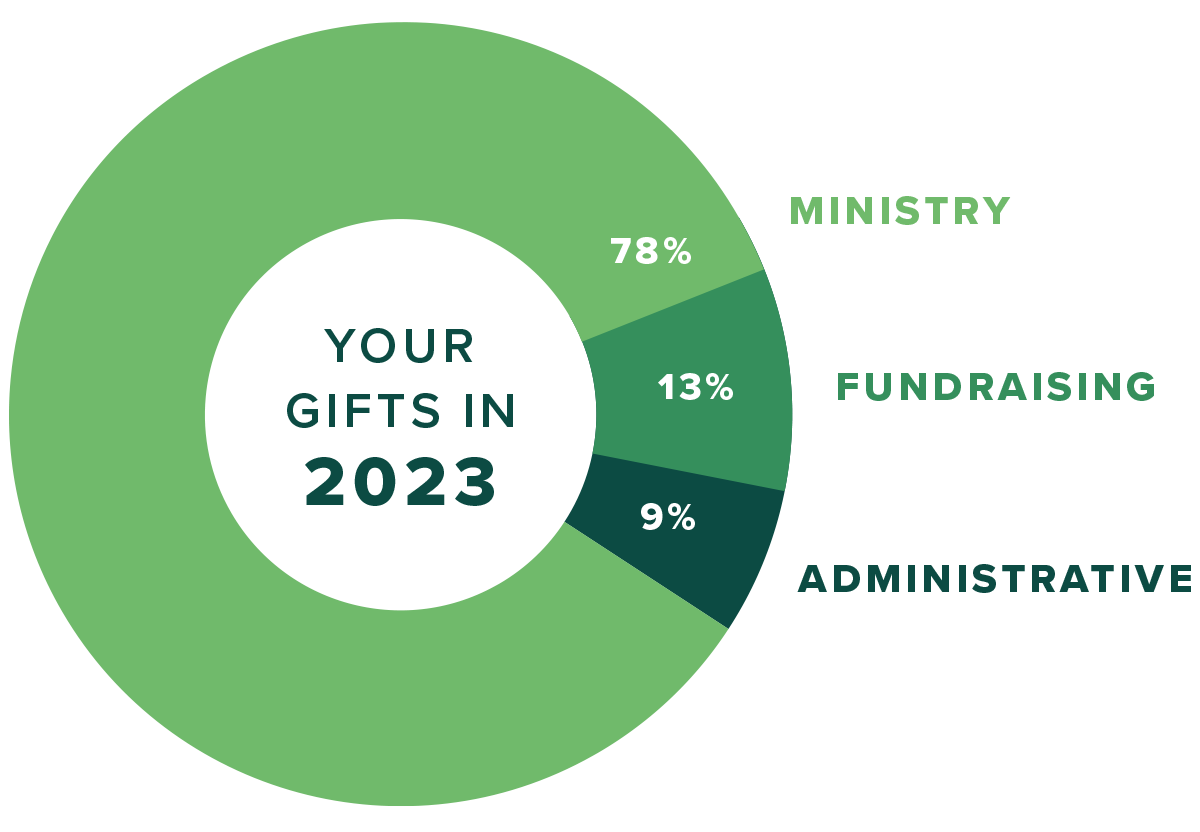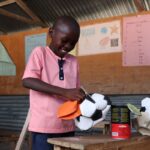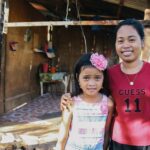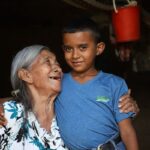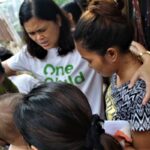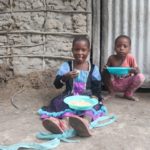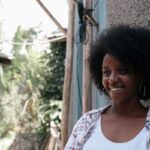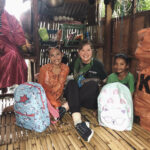Child Champions Rally to Fix
Child Champions in Kenya come together under the scorching sun to rebuild the dilapidated house of a sponsored child in Turkana.
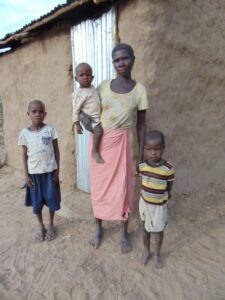
Akerit Lokamar, left, and her family live in a mud house with an iron roof.
Child Champions at OneChild understand that they are mentors to the kids in the impoverished communities where they serve.
As a way of connecting with the community better and teaching kids the art of giving, these great Child Champions in Turkana and the field staff in Kenya went out of their way to help renovate a sponsored child’s cracked house.
Turkana is a remote, tribal community in northwestern Kenya that had for a long time been forgotten by the previous governments.
Male members of the Turkana community herd cattle, goats, and camels while women are in charge of house chores that include sourcing for food, cooking meals for their families, fetching water that is often far from their homes, caring for their children at home, fetching firewood from the bushes, and many other chores.
According to Turkana tradition, despite the woman looking for food and preparing it, they can only eat after the men have eaten. This, they say, is a sign of respect to the men in their society.
The area receives little to no rainfall annually, and this forces the Turkana to travel long distances to look for pasture and water for their animals.
Walls of Sticks and Roofs of Bark
Being a semi-arid place, Turkana experiences very high temperatures. This has made the community naturally adapt at constructing manyatta huts, traditional Turkana houses. The manyattas in Turkana, unlike other manyattas in Kenya, have walls made solely of sticks, for free flow of air given the high temperatures. Their roofs are made of tree bark gathered from nearby bushes.
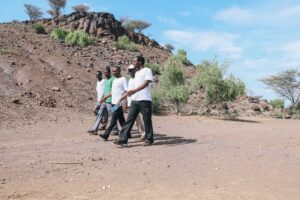
The field staff members walk to the sponsored child’s home, which is a bit of a distance from the Hope Center.
According to Turkana tradition, these houses are to be constructed by women. Hence, most homes are short in height. The community, however, is slowly adapting to building iron-roofed houses. These iron-roofed houses are partly constructed by men because the houses are slightly taller than the manyatta houses and are more difficult to construct.
The process starts by women walking for miles to look for thick bushes where they would find trees to cut down for the big sticks that form part of the wall of the house. Being a dry place, most plantations in the area have thorny thickets, so the women risk being pierced and injured by the thorns just to get the wood.
The men are then tasked with putting up the frame of the house with the wood and the roofing using iron sheets. After the framing and roofing, the women are tasked with mudding the houses. Women in Turkana are hardworking and have over time learned to easily step in and help the men do the tedious work that comes with building houses.
Mud Walls Were Disintegrating
Akerit Lokamar, a sponsored child in Turkana, and her family own an iron-roofed house. She lives with her parents and her two younger brothers in Lokori. Akerit’s parents sell charcoal and firewood for a living and barely make enough to get by.
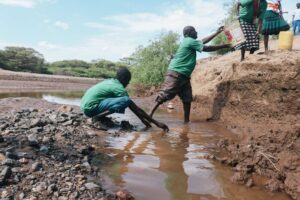
This group was tasked with fetching water from the river and transporting it to the home where the house was set to be repaired.
Akerit registered for the OneChild sponsorship program at Lokori Hope Center in 2016 when she was 4 years old. She loves attending the Saturday program at the Hope Center, where she receives a healthful meal. She is also provided with bedsheets, a mosquito net, and she gets to play with her friends and learn about Jesus and the hope that Christ brings to children.
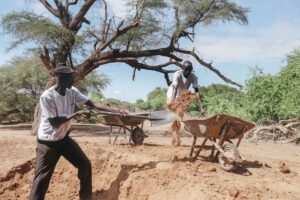
This group was tasked with digging up soil and ferrying it to the site of repair.
Akerit, now 8, attends Kadam ECDE center and loves mathematics the most. Her family’s house was in bad shape because of the scorching sun that had caused the mud that held their house together to disintegrate.
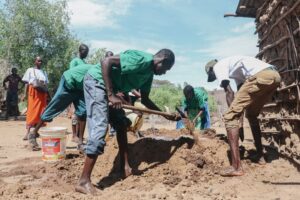
This group was tasked with mixing up the soil and the water into a solid mud before the whole process of mudding begins. The mixing begins with a spade, but because the whole activity has to be cleared in minutes, these young men decided to get their feet “dirty.” It was easier to mix the whole mixture with feet than with a spade.
But because of the amount of work that comes with repairing their house and the dire state that the family was in, her parents didn’t have time to make repairs because they had to work.
Building Up a Child and Her House
During a home visit, Akerit’s Child Champions noticed that the house was in bad shape and would worsen if nothing was done soon. The Child Champions quickly rallied more people from other Hope Centers to help renovate the house.
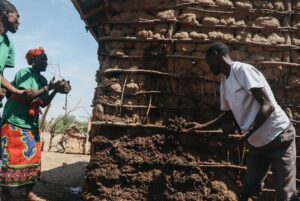
This group was then tasked with mudding the house. The house was mudded with love from inside-out. They were able to complete a task that usually takes days in only an hour.
One advantage that Akerit’s family has is that it is close to Kerio River. This river is the only source of life that Turkana has. The seasonal river provides a great relief to the families in the area because, despite receiving no rainfall, they can rely on the river for water for domestic use and for their animals.
With the river nearby, Child Champions swiftly moved to renovate the house.
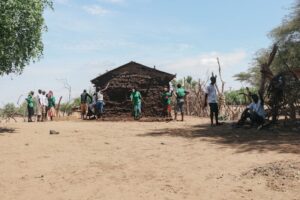
After two hours of working in high temperatures, the team was able to mud the entire house.
To make work easier, the Child Champions spilt into four small groups. Group 1 was tasked with fetching water from the river and transporting it to the home where the house was set to be repaired.
Group 2 was to dig up soil and ferry it by wheelbarrow to the site of repair.
Group 3 was tasked with mixing the soil and the water into mud. These young men decided to mix the mud with their feet rather than a spade to get the job done quickly before it got too hot to work.
Group 4 was in charge of mudding (essentially repairing) the house. Because the team of Child Champions was well organized, they were able to complete the repairs in two hours, when it typically takes days to complete.
These Child Champions understand that their role is to help build up the kids, emotionally, spiritually, physically, but this time they built up the child’s house as well.
Give hope to children when hope seems lost through the Children’s Crisis Fund.
Be inspired as Child Champions help rebuild a sponsored boy’s home after it was swept away in a flood in the Dominican Republic:
We are accountable to the children we serve AND to our donors.
Our accountability to our donors is one of our highest priorities. Our goal is to use the funds entrusted to us as wise stewards. To do this requires continued monitoring of our fund distribution. OneChild is also a member in good standing with the Evangelical Council for Financial Accountability (ECFA)
